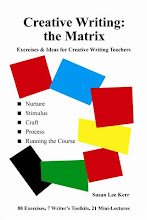A challenge this week, and one that arises in just about every creative writing class -- commas. Okay, colons, semi-colons, run-on sentences, non-sentences and apostrophes, too. Mostly my adult students arrive with punctuation and grammar skills, but now and then someone gives me a good, or even excellent, piece of writing marred by flaws in basic language craft. What to do? How to help?
I'm intuitive at punc & grammar -- I guess I was taught right somewhere early on, plus I was raised reading The New Yorker, and my father was a journalist, my mother an avid reader. It's all to do with the rhythm of writing. I know how to do it, but I can't teach the rules. What's more, I don't want to; I'd rather create!
So when I get a good piece with commas randomly splashed about (or not), my copy editor's hand and mind can't resist a lightly pencilled correction. But I hate to give back work all speckled with these picky little marks. On the other hand... if a sentence doesn't make sense... well, it's not very creative if a writer interferes with his/her own clarity of communication, is it? Therefore, fab as a piece might be, it has got in the way of its own creativity. Of course I always feedback on all the good aspects of a piece of writing -- in bigger, stronger comments.
Can anyone out there recommend a super-duper punc & grammar book for creative writers? Fun, correct and NOT BORING? To my student who asked this week I am going to suggest the best I know of, including two evergreens:
- The Elements of Style by William Strunk Jr and EB White; my copy is Allyn & Bacon, 1979, Massachusetts, but the orginal was 1935, with updates 1959, 1972. A slim and amazingly enjoyable read.
- Fowler's Modern English Usage, Oxford University Press (regularly updated). A huge tome, very specific. The section on commas is enlightening, and there's everything else, from a to z.
- Eats, Shoots & Leaves by Lynne Truss, Profile Books, 2003, London. Very entertaining, explains why things like commas got the way they are and gives entertaining guidelines, too. Was on the bestseller list for ages.



No comments:
Post a Comment